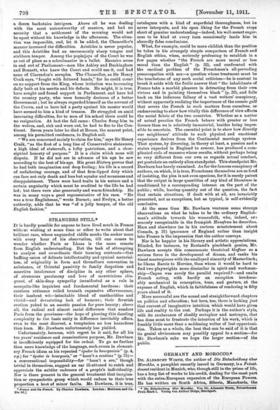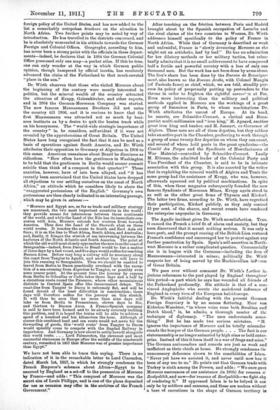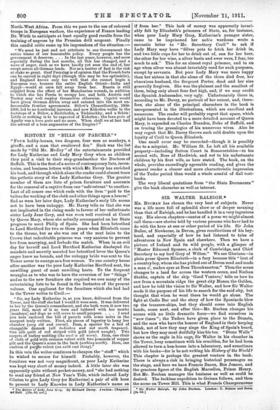GERMANY AND MOROCCO.*
Dn. ALBRECHT WIRTH, the author of Die Entscheiclung fiber Maroklco, a pamphlet recently issued in Germany, is a Privat- dozed resident in Munich, who, though still in the prime of life, has a long list of works to his credit, dealing for the most part with the extra-European expansion of the European Powers. He has written on South Africa, Siberia, Manchuria, the • Die Dascheidisny Sher Marokko. Von Dr. Albrecht Wirth, Privatdozent Preis Mark 1. Verlag von Arthur Dolge, Stuttgart. foreign policy of the United States, and has now added to the list a remarkably outspoken brochure on the situation in
North Africa. Two further points may be noted by way of introduction. He has travelled in the districts concerned, and he is absolutely =muzzled in his attitude towards the German Foreign and Colonial Offices. Geography, according to him, has never been a strong point with the officials in these depart- ments—indeed, he declares that in 1884 the German Colonial Office possessed only one map—a pocket atlas. If this be true, one can only wonder at the way in which German public opinion, though hampered by official inertia, has resolutely advanced the claim of the Fatherland to that much-coveted "place in the sun."
Dr. Wirth observes that those who visited Morocco about the beginning of the century were mostly interested in politics, but the mineral wealth of the country attracted the attention of Krupp, Gelsenkircher, and other experts, and in 1904 the German-Moroccan Company was started. The now famous Mannesmann Brothers did not enter the country till 1906, and it is curious to know that the first Mannesmann was attracted not so much by busi- ness instincts as by a desire to quit the beaten track while on his honeymoon. The " world-wide strategic importance of the country" is, he considers, self-evident if it were not revealed by the apprehensions of Great Britain. The United States have long recognized the fact that it can be used as a basis of operations against South America, and Dr. Wirth attributes their opposition to Germany at Algeciras in 1906 to this cause. American uneasiness about Brazil he dismisses as ridiculous. "How often have the gentlemen in Washington to be told that the gentlemen in Berlin would sooner commit suicide than think of a conquest in that quarter ? " These anxieties, however, have of late been allayed, and "it has recently been ascertained that the United States have dropped all objections to our settling ourselves on the coast of North Africa," an attitude which he considers likely to abate the " exaggerated pretensions of the English." Germany's own
pretensions are then clearly indicated in an interesting passage, which may be given in eztenso :— " Morocco and Egypt are, as far as trade and military strategy are concerned, the two most important countries in the world : they provide means for intercourse between three continents of the world, and while the Land of the Nile has its immediate con- nexion with Asia, Morocco extends her western front towards America. Thus does the Land of the Shereefs abut on three world routes. It touches the route to South and East Asia yid Suez; is on the line to West Africa, South Africa, and Australia ; and, nally, it fringes the stretch of sea intervening between the harbours of the North Atlantic and South America. The point at which the old world most closely approaches thenew is on the coast of Senegambia—indeed, from Dacca to Brazil would be but a matter of three days by a fast vessel, and five days would suffice for reaching Buenos Aires. Before very long a railway will be necessary along the coast from Tangier to Agadir, and another line will have to join this running to Senegambia. Thus we should be enabled to travel from Berlin to Dacca practically overland with the excep- tion of a sea-crossing from Algeciras to 'rangier, or possibly even some nearer point. At the present time the journey by express from Berlin to Gibraltar or Cadiz takes three days and a half by a circuitous route round the Pyrenees, where other mountainous districts in Central Spain offer like inconvenient delays. The coast-line from Tangier to Dacca is extremely fiat, and will be found devoid of the least ilifIrtulties in construction ; three days will therefore suffice for the journey on this stretch. It will thus be seen that no more than nine days will take ns from Berlin to Pernambuco, eleven days to Rio, and thirteen to Buenos Aires. A Franco-Spanish company is said to have been formed and to be already seriously tackling this problem, and it is hoped the trains will be able to achieve a speed of a hundred and ten kilometres the hour. Although of course this combined land and sea route would not serve for the forwarding of goods, this world route' from Tangier to Dacca would speedily come to compete with the Bagdad Railway in importance. And Germany is now about to settle herself alongside this world route. . . . Lord Palmerston, the cleverest and most successful statesman in Europe after the middle of the nineteenth century, remarked in 1857 that Morocco was of greater importance than Egypt."
We have not been able to trace this saying. There is no indication of it in the remarkable letter to Lord Clarendon, dated March 1st, 1857, in which he strongly condemns the French Emperor's schemes about Africa—Egypt to be annexed by England as a set-off to the possession of Morocco by France—and adds : " This conquest of Morocco was the secret aim of Louis Philippe, and is one of the plans deposited for use as occasion may offer in the archives of the French Government."
After touching on the friction between Paris and Madrid brought about by the Spanish occupation of Larache and the rival claims of the two countries to Wezzan, Dr. Wirth addresses himself specifically to the policy of France in North Africa. While that of Germany is described as weak and unfruitful, France is "slowly devouring Morocco as she might eat an artichoke, leaf by leaf." He has no admiration for her dilatory methods or her military tactics, but reluc- tantly admits that it is no small achievement to have conquered half a fertile and powerful country with a loss of only one thousand men. But the work has not been done by arms alone. The lion's share has been done by the Bureau de Renseigne- ment, also known as the Bureau Arabs, with Colonel Mangin (of Fashoda fame) as chief, which, we are told, steadily pur- sues its policy of perpetually putting up pretenders to the throne in order to frighten the rightful soverei.:n at Fez. Even more interesting than the military and political methods applied in Morocco are the workings of a great group of financiers in Paris, to whose machinations Dr. Wirth attributes the unrest of Europe. At its head, he asserts, are Schneider-Creuzot, a clerical and Bona- partist multi-millionaire and "iron king," M. Aynard, another great iron king and banker, and M. Jonnart, ex-Governor of Algiers. These men are all of them deputies, but they seldom take an active part in the Chamber, preferring to work through a group of some twenty-five deputies on whom they can count, and several of whom hold posts in the great syndicates—the Comild des Forges and the Syndicate of Manufacturers of War Material—controlled by Schneider-Creuzot. Lastly M. Etienne, the admitted leader of the Colonial Party and Vice-President of the Chamber, is said to be in intimate association with this group. It is also asserted by the writer that in exploiting the mineral wealth of Algiers and Tunis the same group had the assistance of Krupp, who was, however, afterwards squeezed out by political machinations. In spite of this, when these magnates subsequently founded the now famous Syndicate of Moroccan Mines, Krupp again stood in as well as the other great firms of Thyssen and Kirdorf. The latter two firms, according to Dr. Wirth, have regretted their participation, Kirdorf publicly, as they only control 15 per cent. of the shares, and recent events have rendered the enterprise unpopular in Germany.
The Agadir incident gives Dr. Wirth no satisfaction. True, it caused the French a brief fit of alarm and anxiety, but they soon discovered that it meant nothing serious. It was only a beau geste, and the prompt roaring of the British Lion restored France's confidence and encouraged her to protest against any further penetration by Spain. Spain's self-assertion in North- west Morocco is a rather complicated question. Commercially she is in league with the Germans—including the firm of Mannesmann—interested in mines ; politically Dr. Wirtk suspects her of being moved by the Machiavellian inikrinsi of Great Britain.
We pass over without comment Dr. Wirth's farther jnrious references to the part played by England throughout this period—a part which he says has wounded all friends of the Fatherland profoundly. His attitude is that of a con- vinced Anglophobe who scents the maleficent influence of England in every turn of the European kaleidoscope.
Dr. Wirth's faithful dealing with the present German Foreign Secretary is by no means flattering. Herr von Kiderlen-Waechter, "in whose veins runs both Swabian and Dutch blood," is, he admits, a thorough master of tk. technique of diplomacy. " The man understands some thing." But he has made two serious mistakes. " ignores the importance of Morocco and he totally misunder stands the temper of the German people.. . . The fact is our statesmanship is no longer animated by high aims or bold enter- prise. Instead of this it loses itself in a war of frogs and mice." The German ambassadors and consuls are just as weak and inefficient as their chiefs at home. He strongly condemns Ur unnecessary deference shown to the sensibilities of Islam, "Never yet have we assisted it, and never until now has it been of any use to us." He points oat that German trade with Turkey is sixth among the Powers, and adds : " We once gave Morocco assurances of our assistance (in 1905) for reasons Realpolitik, and now—for-reasons of Realpolitik—we fight eh, of rendering it." If oppressed Islam is to be helped it cav only be by soldiers and cannons, and these are useless without a base of operations in the shape of German territory in
North-West Africa. From this we pass to the use of coloured troops in European warfare, the experience of France leading Dr. Wirth to anticipate at least equally good results from the training of negroes by the Prussian drill sergeant. Finally this candid critic sums up his impressions of the situation :—
" We must be just and not attribute to our Government the entire blame of our lamentable policy. Every people has the government it deserves. . . . In the last years, however, and more especially during the last months, all this has changed, and a wave of anger, such as we have hardly yet seen the end of, has swept across all German lands. Nor as a matter of fact is the risk at stake so great. Graf Freysing is of opinion that the French forts can be carried in eight days (though this may be too optimistic), and England knows only too well that she cannot begin a European war, because the entire English Orient—India and Egypt—would at once fall away from her. Russia is still crippled from the effect of her Manchurian wounds, in addition to which she has Persia to occupy her, and both Austria and Turkey may well employ themselves otherwise. Caprivi would have given German Africa away and entered into the most un- favourable frontier agreements. Billow's Chancellorship, 1900- 1909, led to no territorial increase, and now Kiderlen walks in the footsteps of a Billow, a Richthofen, a Tschirschky, and a Schein ! Little or nothing is to be expected of Kiderlen; the beau geste of Agadir was a beau geste and no more. When shall we at last hail the advent of a true augmenter of the Empire ? "




















































 Previous page
Previous page